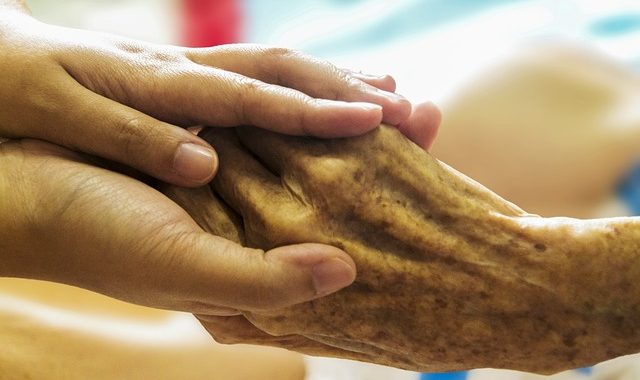
What to Say to Someone Who Is Dying
What to Say to Someone Who Is Dying
Do you know what to say to someone who is dying? It’s no secret that talking about death is very uncomfortable. We are a death-denying culture. When someone close to us faces that reality, we are often at a loss of words. At 1-800-HOSPICE™, we want to help families and friends know what to say to someone who is dying. We do this to give relief to those who are at a loss of words, and for those who face a life-limiting illness.
Listen, Rather Than Speak
“Most of the time I really liked when people said nothing,” remembers Michelle Colon-Johnson, a five time cancer survivor.
In times of uncertainty, we all react in different ways. It’s hard to know what to say to someone who is dying. Some people feel the need to find an answer, or to justify the circumstances. We sometimes feel obligated to say something to fix the problem, but we can’t do that. Nobody expects it, either.
What you should focus on instead is to understand your loved one and to listen to them. It is especially important for you to be there for them. You don’t have to know what to say to someone who is dying. Marty Tousley, a Grief Counselor and moderator for Grief Healing Discussion Groups says, “Don’t desert the one who is dying. Let that person take the lead.”
Love is a Priority
Loving a person who is dying takes precedence over all. You don’t have to pretend that nothing is wrong. Be honest. Feel free to talk about how you feel, but be sure to listen to your loved one as well. Although it may seem counterintuitive, it’s ok to talk about dying even with the person who is facing it. Go above and beyond in fulfilling the needs of your loved one in this time is perhaps the greatest gift you could give them, and we are talking about emotional needs, not medical needs.
Someone who is dying should be respected in their decision making. Don’t try to pressure them into making your decisions. They need to decide for themselves what they will do with what little time they have left. If they are conscious, let them take the lead. Just in how you should take cues from them in conversation, let them make decisions in practical and legal issues. You can make suggestions and help them in their requests, but let them be in charge. You shouldn’t put these things off either. Waiting until the last minute to settle matters is never a good idea. Encourage your loved one to address all loose ends sooner rather than later.
Be a Peacemaker
Everyone is affected by death. Each family member will respond to it in their own way. Emotions can flair, whether it be sadness, anger, fear, regret, or something else. The last thing someone who is dying needs is their family in turmoil around them. You can help the situation by encouraging an environment of peace. If family members are arguing or tempers are flaring, take them outside. Don’t contribute to the chaos. Although attention will be drawn to the person who is ill or in hospice, don’t forget about your family who is dealing with imminent loss, and don’t forget about yourself. The world still turns, and with it so do daily demands. Preparing for death requires a lot of energy. Be sensitive to how you are doing and take time for yourself to process. By taking the lead and being an example in your behavior, everyone will feel more at peace.
What is Hospice?
A word that might be brought up at this time is hospice. You might be wondering what hospice is and how it is relevant. The word hospice is derived from a medieval word meaning a place for weary travelers to stop and rest. The history of hospice began nearly one thousand years ago, and has experienced many different incarnations over that time. The first modern hospice center was constructed in London in 1948. Since its conception, hospice has been realized the world over as valuable and important to human health and dignity. Hospice is a type of care that is offered to terminally ill patients who are given six months or less to live by a doctor. Hospice is not preventative care, nor is it curative. Hospice strives to make a dying individual as comfortable as possible as well as improve their quality of life.
Why Hospice?
Although there is stigma surrounding hospice care, it is actually one of the better services you could offer to a loved one. Hospice isn’t a hospital, it is pain management, support, and security. When both you and your loved one understand that there is no cure in sight, hospice is the best option. Making the most of time left, ensuring that a patient is as comfortable as possible, and counseling for families – these are some services that hospice provides. Hospice is about improving the quality of life for a dying individual. If finances are a concern, Medicare can pay for hospice, and hospice care can be provided at home. Hospice is not giving up, it is a powerful expression of love.
Hospice professionals understand when many well-meaning people don’t. You can count on them to know what your family is going through. Don’t be afraid to reach out to a hospice provider, even if just to ask some questions. Building a support group is incredibly important. Many hospice providers have resources such as support groups and counseling for families in need. A time like this could even be a good opportunity to reconnect with your family and friends. You might not always have the right words to say, but you can know that you aren’t alone. Time doesn’t wait, start the conversation now.






